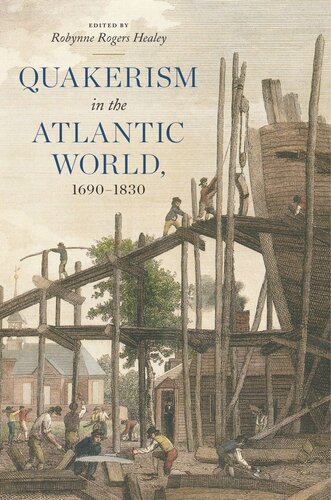

Most ebook files are in PDF format, so you can easily read them using various software such as Foxit Reader or directly on the Google Chrome browser.
Some ebook files are released by publishers in other formats such as .awz, .mobi, .epub, .fb2, etc. You may need to install specific software to read these formats on mobile/PC, such as Calibre.
Please read the tutorial at this link: https://ebookbell.com/faq
We offer FREE conversion to the popular formats you request; however, this may take some time. Therefore, right after payment, please email us, and we will try to provide the service as quickly as possible.
For some exceptional file formats or broken links (if any), please refrain from opening any disputes. Instead, email us first, and we will try to assist within a maximum of 6 hours.
EbookBell Team

4.0
66 reviewsThis third installment in the New History of Quakerism series is a comprehensive assessment of transatlantic Quakerism across the long eighteenth century, a period during which Quakers became increasingly sectarian even as they expanded their engagement with politics, trade, industry, and science. The contributors to this volume interrogate and deconstruct this paradox, complicating traditional interpretations of what has been termed “Quietist Quakerism.”
Examining the period following the Toleration Act in England of 1689 through the Hicksite-Orthodox Separation in North America, this work situates Quakers in the eighteenth-century British Atlantic world. Three thematic sections—exploring unique Quaker testimonies and practices; tensions between Quakerism in community and Quakerism in the world; and expressions of Quakerism around the Atlantic world—broaden geographic understandings of the Quaker Atlantic experience to determine how local events shaped expressions of Quakerism. The authors challenge oversimplified interpretations of Quaker practices and reveal a complex Quaker world, one in which prescription and practice were more often negotiated than dictated, even after the mid-eighteenth-century “reformation” and tightening of the Discipline on both sides of the Atlantic.
Accessible and well-researched, Quakerism in the Atlantic World, 1690-1830,provides fresh insights and raises new questions about an understudied period of Quaker history.
In addition to the editor, the contributors to this volume include Richard C. Allen, Erin Bell, Erica Canela, Elizabeth Cazden, Andrew Fincham, Sydney Harker, Rosalind Johnson, Emma Lapsansky-Werner, Jon Mitchell, and Geoffrey Plank.